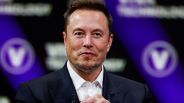Tesla surprised consumers with its innovative technology yet again with its Model X and native features. The new SUV, which was modeled after its predecessor, the Model S, is once again making a mark in the auto industry.
Just recently, Tesla rolled out its Model X, introducing a built-in bioweapon defense mode, which will protect the people inside the vehicle when faced against a chemical attack. The marvelous features don't end there, as the falcon-wing doors are equally amazing.
Compact parking spaces are not a problem for the falcon-wing doors, as they are double hinged, allowing the doors to bend like an elbow and have more maneuverability to be opened in cramped situations. Compared to gull-wing doors, the falcon-wing doors bear some similarities, such as the fact that the hinges — except for an extra hinge — are on top and that they open vertically rather than horizontally.
But the most noteworthy technology integrated into Model X's doors is its built-in sensors that can read its surroundings. Model X's falcon-wing door uses sonar to detect surrounding objects, and because of that, the detector can function inside the SUV's door, preserving the vehicle's sleek design. This makes getting out of the Model X an easy task even in compact garage spaces and parking lots.
With two electric motors, the Model X can run about 250 miles before it needs another recharge, and it is also fitted with panoramic windshields, which is "the largest single piece of glass ever used in a car."
However, Elon Musk, Tesla's CEO and product architect, says that it is difficult to engineer such parts.
"I'm not sure anyone should make this car, really. I mean, yeah. There is far more there than is really necessary to sell a car," Musk said.
But experts suggest that the Model X will be a huge success soon, as it will be treated as a status symbol.
Tesla's Model X is priced at $144,000, and it was only launched after two years of its official announcement date. The carmaker is also working on a "lower-cost" version, according to Musk.
ⓒ 2025 TECHTIMES.com All rights reserved. Do not reproduce without permission.




